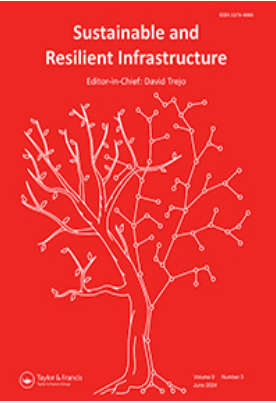可持续和有弹性基础设施适应性规划特刊一:导言
IF 2.2
Q2 ENGINEERING, CIVIL
引用次数: 0
摘要
当基础设施满足当前需求而不牺牲未来需求时,它们是可持续的。当基础设施能够从自然灾害(如地震、海啸、飓风、旋风、龙卷风、洪水和干旱)、人为灾害(如人为错误、恶意攻击)带来的灾害中恢复过来,并能够抵御恶化和服务减少时,基础设施就具有弹性。可持续性和复原力是相互依存的。可持续性要求节约使用有限的资源,尽量减少对环境的影响,而弹性则需要资源来确保建筑环境的性能。可持续性和弹性都受到我们不断变化的环境的影响。适应性和综合抗灾能力以及可持续性依赖于以系统、综合和动态的方式设计和建设抗灾能力。本期《可持续和弹性基础设施的适应性规划》特刊继续探讨如何在不断变化的环境条件下将灵活性融入基础设施的规划、设计和建设中。这种规划、设计和建设必须取决于未来的条件和适应性路径,必须确定可以逐步实施的行动或过程,以产生包容性、经济性、弹性和可持续的基础设施。这份关于可持续和弹性基础设施适应性规划的专题报告是由抗灾基础设施联盟(CDRI)赞助的《弹性基础设施适应性路径》专题报告的延续。该SI寻求基于证据的科学和工程以及案例研究,以促进针对决策者和实践者的适应性途径。与最初的SI一样,该SI的最终目标是实施这些实践,以增强方法和流程的稳健性,从而实现可持续和有弹性的基础设施。本专题涵盖四个一般主题:开发规划工具以减轻洪水风险,开发规划工具以改善飓风造成的灾害脆弱性,评估废水管理实践以及如何修改这些实践以适应环境,以及开发高效能源规划模型。Masterson等人介绍了一种以证据为基础的增强准备技术的新方法,用于开发改进飓风规划的改进实践,作者将其称为iq计划。开发的框架使用GIS中的定性评估和空间分析来开发这些综合计划。然后,作者应用该框架为德克萨斯州罗克波特市制定了一项新的综合计划,该城市在2017年遭受了哈维飓风的严重破坏。使用集成计划的结果表明计划质量和集成得到了改善。Shandiz等人研究了新的净零排放社区(NZECs)的能源总体规划(EMP),并得出结论认为,与这些系统的可靠性和经济性相关的普遍看法可能是不正确的。结果表明,EMP对nzec的处理是可靠的、经济的。Beleno de Oliveira等人提出了一个框架来分析未来的洪水情景,考虑到气候变化的影响以及由此导致的降雨加剧和平均海平面上升,无计划的城市化和不受控制的土地利用,这些都会给排水基础设施带来压力,以及维护实践如何影响这些城市排水系统。作者得出的结论是,没有适当和维护的基础设施的无计划城市增长可能比气候变化的影响更大。作者指出了对这些系统进行良好规划和持续维护的重要性。Ross等人探讨了洪水规划的制度实践,并得出结论,适应性规划在洪水规划中基本缺失。作者得出结论,洪水规划通常是以静态的方式进行的,没有充分考虑未来的不确定性,这些规划未能吸引不同的参与,而且这些规划往往忽视了追求共同利益。需要实施适应性规划。最后,Porse等人评估了废水管理的适应途径。作者报告说,很少有研究调查了过去的设计假设如何影响废水管理。作者报告说,加州的废水工业在很大程度上是在寻求一种渐进的适应途径。本文提出了一种参与式自适应规划方法。可持续和弹性基础设施,2023,第8卷,第1期。4,357 - 358 https://doi.org/10.1080/23789689.2023.2218152本文章由计算机程序翻译,如有差异,请以英文原文为准。
Special issue on adaptive planning for sustainable and resilient infrastructure i: an introduction
Infrastructure are sustainable when they address present needs without sacrificing future needs. Infrastructure are resilient when they are able to recover from disasters brought by natural hazards (e.g., earthquakes, tsunamis, hurricanes, cyclones, tornados, floodings and droughts), anthropogenic hazards (e.g., human errors, malevolent attacks), and are able to resist deterioration and reduced service. Sustainability and resilience are interdependent. Sustainability calls for parsimonious use of limited resources with minimal environmental impact while resiliency requires resources to ensure performance of the built environment. Both sustainability and resiliency are impacted by our changing environment. Adaptive and integrated disaster resilience, and thus sustainability, is dependent on designing and building resilience in a systematic, integrated, and dynamic manner. This Special Issue (SI) on Adaptive Planning for Sustainable and Resilient Infrastructure I continues to seek to better understand how to integrate flexibility into infrastructure planning, design and construction under changing environmental conditions. This planning, design and construction must depend on future conditions and adaptive pathways must identify actions or processes that can be progressively implemented to produce inclusive, economical, resilient and sustainable infrastructure. This SI on Adaptive Planning for Sustainable and Resilient Infrastructure I is a continuation of our initial SI on Adaptive Pathways for Resilient Infrastructure, sponsored by the Coalition for Disaster Resilient Infrastructure (CDRI). This SI sought evidence-based science and engineering and case studies that promote adaptive pathways to target policymakers and practitioners. Like the initial SI, the ultimate objective of this SI is to implement these practices to enhance the robustness of methods and processes that result in sustainable and resilient infrastructure. This SI covers four general topics: development of planning tools to mitigate flood risks, development of planning tools to improve hazard vulnerability due to hurricanes, an assessment of wastewater management practices and how these practices can be modified to be adaptive, and the development of a model for efficient energy planning. Masterson et al. introduce a new approach for an evidence-based enhanced preparatory technique for developing improved practices for improved hurricane planning, referred to by the authors as Plan I.Q. The developed framework uses qualitative assessment and spatial analysis in GIS to develop these integrated plans. The authors then applied the framework for the development of a new comprehensive plan for the City of Rockport, Texas, which incurred heavy damages from Hurricane Harvey in 2017. The results from using the integrated plan indicated improvements to plan quality and integration. Shandiz et al. address energy master planning (EMP) for new net-zero emissions communities (NZECs) and conclude that the common perceptions associated with the reliability and economics of these systems can be incorrect. The authors show that EMP for NZECs can be reliable and economical. Beleno de Oliveira et al. present a framework to analyse future flood scenarios considering the effects of climate change and resulting rainfall intensification and mean sea level rise, unplanned urbanization and uncontrolled land use that can stress drainage infrastructure, and how maintenance practices affect these urban drainage systems. The authors conclude that unplanned urban growth without adequate and maintained infrastructure can be more influencing than climate change. The authors note the importance of good planning and continued maintenance of these systems. Ross et al. explore institutional practices for flood planning and conclude that adaptive planning is largely absent in flood planning. The authors conclude flood planning is often performed in static terms that do not fully consider future uncertainties, that these plans fail to engage diverse participation, and these plans often and neglect to pursue co-benefits. The implementation of adaptive planning is needed. Finally, Porse et al. evaluate adaptation pathways for wastewater management. The authors report that few studies have investigated how past design assumptions influence wastewater management. The authors report California’s wastewater industry is largely pursuing an incremental adaptation pathway. The paper presents an engaged approach adaptive planning. SUSTAINABLE AND RESILIENT INFRASTRUCTURE 2023, VOL. 8, NO. 4, 357–358 https://doi.org/10.1080/23789689.2023.2218152
求助全文
通过发布文献求助,成功后即可免费获取论文全文。
去求助
来源期刊

Sustainable and Resilient Infrastructure
ENGINEERING, CIVIL-
CiteScore
7.60
自引率
10.20%
发文量
34
期刊介绍:
Sustainable and Resilient Infrastructure is an interdisciplinary journal that focuses on the sustainable development of resilient communities.
Sustainability is defined in relation to the ability of infrastructure to address the needs of the present without sacrificing the ability of future generations to meet their needs. Resilience is considered in relation to both natural hazards (like earthquakes, tsunami, hurricanes, cyclones, tornado, flooding and drought) and anthropogenic hazards (like human errors and malevolent attacks.) Resilience is taken to depend both on the performance of the built and modified natural environment and on the contextual characteristics of social, economic and political institutions. Sustainability and resilience are considered both for physical and non-physical infrastructure.
 求助内容:
求助内容: 应助结果提醒方式:
应助结果提醒方式:


